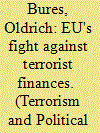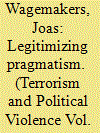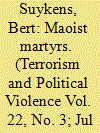|
|
|
Sort Order |
|
|
|
Items / Page
|
|
|
|
|
|
|
| Srl | Item |
| 1 |
ID:
097179


|
|
|
|
|
| Publication |
2010.
|
| Summary/Abstract |
This article offers an analysis of the European Union's (EU) efforts in the fight against terrorist finances. Following the 9/11 attacks, the EU has adopted the relevant United Nations counterterrorism resolutions as well as the special recommendations of Financial Action Task Force. In addition, the EU has developed its own measures spanning across all of its three pillars. There is, however, a cause for concern that some of these measures have not been properly implemented, while others have been criticized on legal, transparency, legitimacy, and efficiency grounds. These shortcomings are not only due to EU's own internal obstacles, but also result from the EU's uncritical adoption of the prevailing smart sanctions and money-laundering regimes, which are based on a number of unwarranted assumptions that do not reflect the nature of contemporary terrorist threats in Europe.
|
|
|
|
|
|
|
|
|
|
|
|
|
|
|
|
| 2 |
ID:
097178


|
|
|
|
|
| Publication |
2010.
|
| Summary/Abstract |
This article provides a discussion of the foundation of Lashkar-i-Taiba (LeT), the development of its modus operandi, and engages in an investigation of LeT's activities in India and Pakistan, including the Kashmir region. Further, LeT's fundraising methods are touched upon and LeT's relationships with regional state and non-state actors such as Pakistan's Inter-Services Intelligence (ISI) and Dawood Ibrahim's D-Company are analysed. This article argues that although LeT has been a vital component of Islamabad's regional strategy in the past, the organisation has grown beyond the control of its former patron and is largely self-sufficient and is able to operate independently of the political process. These developments challenge the long-held notion that irregulars can be sustainably used to achieve limited objectives in an asymmetric conflict and should serve as a clear warning to other state sponsors of terrorism. However, contrary to many analyses, LeT is not likely to sacrifice its independence and come under Al-Qaeda's umbrella. Rather, LeT will continue to evolve into a distinctive terrorist actor in its own right while still receiving aid from fringe elements in Pakistan's security and intelligence apparatus and elsewhere.
|
|
|
|
|
|
|
|
|
|
|
|
|
|
|
|
| 3 |
ID:
097176


|
|
|
|
|
| Publication |
2010.
|
| Summary/Abstract |
This article shows how Hamas legitimized its policy choices during the Al-Aqsa intifada and the Gaza war. The organization's policy moved from violent during the initial stages of the uprising to more moderate during later years. While this entailed huge changes in the organization's course of action, Hamas nevertheless always managed to frame its choices in a way that seemed consistent with its long-held beliefs. The same occurred during the Gaza war, when Hamas moderated its discourse even further. This shows Hamas' flexibility and pragmatism but also that seemingly rigid ideological views can change quite dramatically when circumstances change too.
|
|
|
|
|
|
|
|
|
|
|
|
|
|
|
|
| 4 |
ID:
097177


|
|
|
|
|
| Publication |
2010.
|
| Summary/Abstract |
By closely analysing Naxalite propaganda material, I explain the functionality of martyrdom in the Maoist movement in India. I show that their concept of secular martyrdom is multifaceted, but can be traced to a mix of several elements in classical Maoist doctrine (sacrifice, dialectics, and critique). As such, the cult of the secular martyr serves both practical and ideological aims. My analysis, tracing martyrdom to secular ideology, opens new possibilities for studying this type of martyrdom, which has come under pressure in the wake of the 9/11 attacks.
|
|
|
|
|
|
|
|
|
|
|
|
|
|
|
|
| 5 |
ID:
097180


|
|
|
|
|
| Publication |
2010.
|
| Summary/Abstract |
The history and identity of fundamentalism is complex. Religious fundamentalism names an ideological perspective found in most, if not all, major religions and is currently associated with variant forms of extremism and religiously-motivated acts of violence, including terrorism. Following a discussion of religious extremism per se, a typological paradigm of religious fundamentalism that attempts to demonstrate the ideological development from what might be referred to as an "initial" and relatively benign fundamentalism into extremism and thence to terrorism, will be presented. A discussion of a model of fundamentalism as applied to Islam will provide a comparative basis for assessing Christian fundamentalism and extremism, so setting the scene for an applied exploration of religious extremism and terrorism with particular reference to Christian contexts and examples.
|
|
|
|
|
|
|
|
|
|
|
|
|
|
|
|
| 6 |
ID:
097175


|
|
|
|
|
| Publication |
2010.
|
| Summary/Abstract |
This article revisits the debate, hosted by this journal in the 1990s, on whether the Provisional IRA campaign was sectarian. In the light of current debates about how Northern Ireland deals with its past, it challenges the analysis that emphasises the non-sectarian ideology of republicanism and ignores the effects of IRA violence. It uses research on the IRA campaign in Fermanagh and south Tyrone to argue that the campaign was unavoidably sectarian but rejects current attempts to label it a form of "ethnic cleansing."
|
|
|
|
|
|
|
|
|
|
|
|
|
|
|
|
|
|
|
|
|